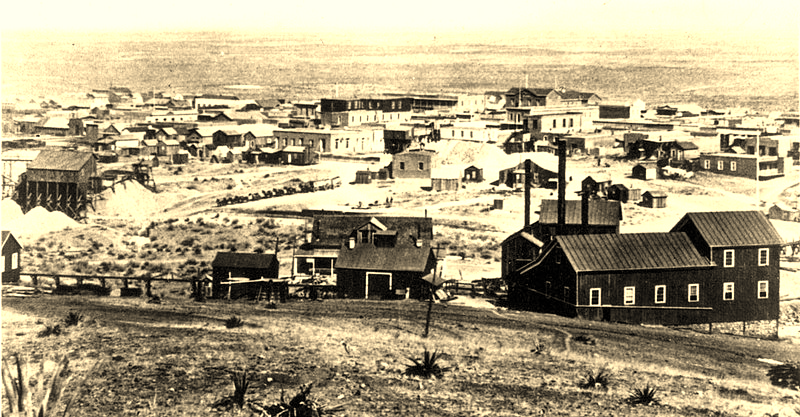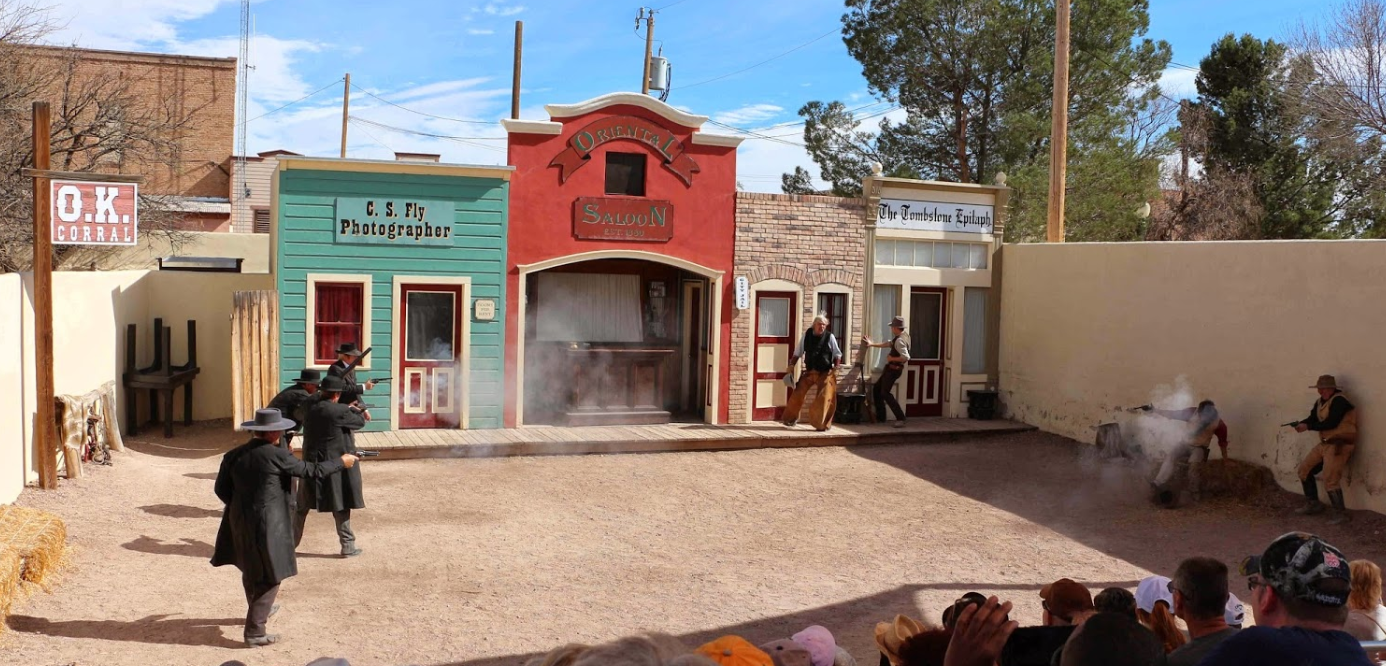|
|
Roundup at the O.K. Corral 1
Lakefield, Qué, October 3, 2020
With malice toward none 2
Truth is that my corral isn't all that O.K. Let's rephrase that: My own corral isn't O.K. at all. Never really was, but now that I am an old fogey, many a memory has broken through the fences. And so I have to keep looking things up; here, there, everywhere. Funny thing is that often some uncalled for memory just pops up. How I named this piece, for example. 3
I typed "OK Corral" in my browser's menu bar and there it was: "Gunfight at the O.K. Corral." 4

Tombstone, Arizona, in 1881, photographed by C.S. Fly. The Gunfight at the O.K. Corral was a 30-second shootout between lawmen and members of a loosely organized group of outlaws called the Cowboys that took place at about 3:00 p.m. on Wednesday, October 26, 1881, in Tombstone, Arizona Territory, United States. It is generally regarded as the most famous shootout in the history of the American Wild West. ( Ref.) 5
I still don't recall it. One of those things, I guess, that makes old fogeys ramble. The world, now, is less concerned with the history of the American Wild West than with a political shootout in the country's Wild East where a loosely organized group of politicians is preparing for hanging on to power by some never-ending finagling with facts and the laws of the land. We had an example of that with a widely televised debate, on September 29, between the incumbent president of the United States, Donald Trump, and a former vice-president, Joe Biden. Trump, his unsavory reputation notwithstanding, has a huge following among the electorate and the support of most Republican politicians. 6
While working on this story, news broke that President Trump has caught the corona virus. 6a
Politics, however, is not te main issue of this story. The "roundup" part is. It's about a so-named democracy that is failing people under numerous, mostly global threats with global warming topping the list. Or would it be ignorance? Wilful ignorance? A bias? 7
I have been suspecting for quite some time that society will not ever function remotely similar to how it did before Covid-19. Now I just found out that I am not alone harboring this notion. "There is no getting 'back to normal,' experts say. The sooner we accept that, the better" is a headline on the website of CNN. Quoting: "The danger comes from hankering for normalcy again, rather than getting on with working out how to deal with whatever is ahead." 8
The experts mentioned in the article are evolutionary economist Thomas Davenport, and psychologist Sonja Lyubomirsky. Davenport is distinguished professor of information technology and management at Babson College in Wellesley, Massachusetts. Lyubomirsky is distinguished professor of psychology at the Riverside campus of the University of California. 9
Turning to Prof. Davenport first. From his article "How to Make Better Decisions About Coronavirus":
"Emotion-driven beliefs and intuition are powerful at guiding people toward less-than-optimal decisions. By understanding our biases, we have a better chance of quieting them and moving toward better choices."
I am including some of his as well as my own comments:
• Normalcy bias. A refusal to plan for, or react to, a disaster which has never happened before.
• Status quo bias. A liking for things to stay about the same. It considers "the current state of affairs to be optimal and anything different as a loss." About six years ago, I proposed that the Canadian Senate should expand its investigative role into an investigative, anticipating, and critical problem-solving role. This never came to pass.
• Political bias. Politics affects how people interpret information and make decisions.
• Confirmation bias. A tendency to search for, interpret, focus on, and remember information in a way that confirms one's preconceptions. "It's a more generalized case of political bias."
• Availability heuristic. A tendency to overestimate the likelihood of events that come to mind more often. For example, by the ready availability of items in the news. Today (October 2), I read that the British Prime Minister is sure that Trump will stage a strong recovery. This tidbit is splattered all over the news. But how can he possibly be sure of that? To me, this is a ridiculous assertion, but who am I compared to the British Prime Minister?
• Framing effect. Drawing different conclusions from the same information depending on how that information is presented.
"At the moment, the very large and important issue of how to manage the virus in the U.S. is increasingly framed as a 'save the economy or lock everything down' question, with President Trump weighing in on the former side (at least initially) and scientists largely on the latter." Besides, either/or framing masks the possibility of alternatives. "If possible, consider multiple different framings of the same decision—ideally some with nonbinary outcomes."
• Bandwagon effect. A tendency to do (or believe) things because many other people do (or believe) the same. "Day to day during the pandemic's course, you'll notice various ideas rising and falling in what dominates the conversation. The nature of these topic-of-the-moment dialogues is that they often grow fast and full of inaccuracies until clearer thinking shuts them down."
• Hostile attribution bias. A tendency to interpret behaviors of people we don't agree with as having hostile intent, even when their behavior is ambiguous or benign.
• Neglect of probability. A tendency to completely disregard probability when deciding among options. "No treatment or intervention can lower the relevant probability to zero or raise it to 100%; one can only lower or raise the probability within limits. Yet many lay people are uncomfortable with probabilistic thinking, and have a strong preference for absolute judgments."
"In the case of COVID-19, probabilistic thinking and decision-making are made even more difficult by the shortage of good data on how the virus is transmitted, death or hospitalization rates in infected patients, and the most effective treatment strategies."
There is no definitive list of decision-oriented biases, but Wikipedia lists 124 of them. "It's sobering to note all the ways in which human brains distort decision processes; perhaps it's a wonder that any good decision is ever made."* 10
Professor Lyubomirsky brings hedonic adaptation into play. This is something hardwired in human minds, a survival instinct originally, to protect us from predators. "When both good and bad things happen, at first you feel intense emotions," said she. "Then you adjust and you go back to baseline. This is much more powerful with positive events. People don't adapt as completely to negative change in their lives." Behaviors that stick become perceived as habits, for example washing our hands more often. When we were young, my wife and I lived through years of food shortage and both of us still abhor food being wasted—we habitually finish our plates. Short-term changes in doing things, on the other hand, make us soon go back to how we did things before. 11
Some time ago I wrote:
"For years I have been curious about what it is that prevents our Senate to better meet the needs of Canadians, to say nothing of human beings worldwide. What group loyalties, I wonder, override loyalty to our country as a whole? Which, for our any senator, comes first, Canada, his province, native language, race, membership in the Senate, political party, social class, esteem, family, offspring? Whatever. And if we can find the answer or answers, will we be able to improve our Senate to better serve our country? Well, let's put that last question on the back-burner for now."—here ff. The status-quo bias puts our Senate's neglect back on a front-burner. And so again: this old fogey still has a lot to learn. And think about. 12
 History, staged in Tombstone, Arizona. What motivates people to view this colorful spectacle? 13 History, staged in Tombstone, Arizona. What motivates people to view this colorful spectacle? 13
Footnotes
I found in Wikipedia a list of cognitive biases subdivided in (1) Belief, decision-making and behavioral, (2) Social, (3) Memory, and (4) others. * fn1
|


